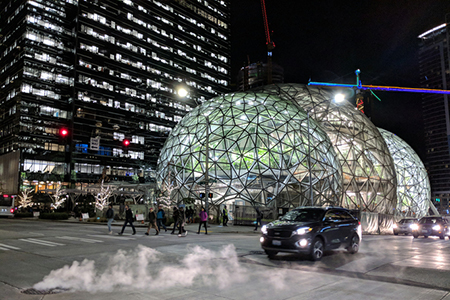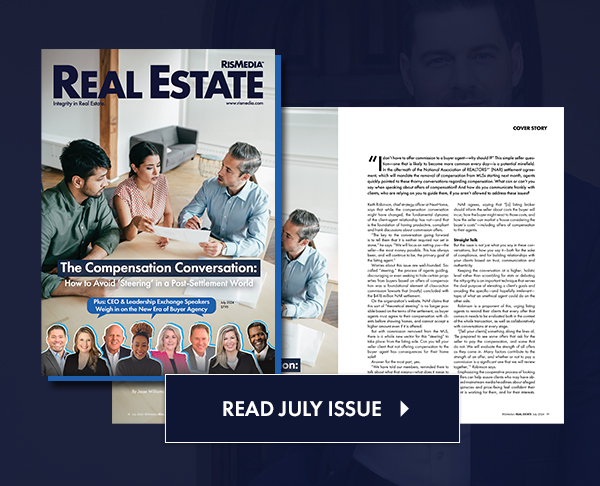Amazon is a step closer to finalizing its HQ2 plans, having narrowed its sights on the top 20 contenders after receiving over 230 proposals from across North America. While the winning city could be any one of the short-list nominees, Amazon has made one thing clear: It is looking to build HQ2 away from the West Coast, which currently houses its principal headquarters in Seattle, Wash. Although Los Angeles is still in the realm of possibility after making Amazon’s top 20 list, most of the other locations are closer to the East Coast, with a few others scattered across the country.
Here are the cities Amazon is zoning in on:
- Toronto, Canada
- Columbus, Ohio
- Indianapolis, Ind.
- Chicago, Ill.
- Denver, Colo.
- Nashville, Tenn.
- Los Angeles, Calif.
- Dallas, Texas
- Austin, Texas
- Boston, Mass.
- New York City, N.Y.
- Newark, N.J.
- Pittsburgh, Pa.
- Philadelphia, Pa.
- Montgomery County, Md.
- Washington, D.C.
- Raleigh, N.C.
- Northern Virginia, Va.
- Atlanta, Ga.
- Miami, Fla.
“Amazon will bring thousands of high-paying jobs to one of these cities and will boost overall local economic growth—all of those highly-skilled engineers will need doctors, real estate agents, barbers, babysitters and baristas, too,” said Aaron Terrazas, senior economist at Zillow, in response to the top 20.
With new job opportunities, the chosen city can expect a surge in relocations or commuters from those seeking employment.
“We would pull from other big cities like Cleveland and Cincinnati and even outside of the state,” says Lee Ritchie, REALTOR® and team leader of the Ritchie Realty Group at RE/MAX Metro Plus in Columbus, Ohio. “We are already pulling in people from outside of the community.”
Daniel Evenchen, REALTOR® with the Mike McCann Team, Berkshire Hathaway HomeServices Fox & Roach REALTORS®, believes Philadelphia’s prime location nearby other massive metro areas is one of the biggest reasons Amazon has short-listed it.
“Of a location perspective, we’re very close to Baltimore, Washington D.C. and New York, but, comparatively, we have a lot of room for growth,” says Evenchen.
If Amazon attracts more individuals willing to relocate rather than commute, the winning location will need to prepare for an influx of incoming buyers and renters. The top 20 cities are already making plans for the possibility of HQ2.
“It is affecting the decisions of buyers and sellers right now,” Evenchen says. “I have a lot of clients who are thinking of selling and brought up Amazon. They are kind of holding off on selling and are thinking of renting their homes instead so that the value of their home appreciates if Amazon comes through. Buyers are thinking this is a great time to buy, as well.”
However, adapting to a flood of new buyers will not be easy. Many of the top 20 cities are currently dealing with tight inventory, a problem that will only be exacerbated if Amazon moves in. The proof is in Seattle.
“…Accommodating growth on this scale will be a challenge for any city,” Terrazas said. “As Amazon grew from a startup bookstore into the nation’s dominant retailer, Seattle grew alongside it—which caused some growing pains. Seattle home values have almost doubled and rents have increased by half, straining affordability.”
Evenchen foresees a challenge in the new construction market. Since the rental market in Philadelphia is moving quickly, any incoming buyers who are looking for new housing may be met with few options.
“The Philadelphia real estate market is probably going to experience a very sharp increase,” says Evenchen. “Right now, the market is extremely soft. We are seeing tenants and renters really negotiating in a tough market. At this point, vacant land is extremely difficult to come by. It’s highly sought-after. would probably just reinforce what’s been going on.”
Ritchie believes Columbus will face similar challenges.
“Our struggle would be that we wouldn’t have enough inventory,” Ritchie says. “We need builders to construct more houses, and prices on existing homes would go up for sure. The Downtown Columbus market—the urban market—is very hot, and a lot of people want to work here. There will be plenty of rentals, but, at this juncture, we may have difficulty in this market.”
Regardless of challenges, these cities made Amazon’s top 20 list for a reason. Ritchie believes Columbus caught Amazon’s eye because of its ability to attract millennials, and its talented workforce, moderate housing costs and standard of living. Terrazas agrees.
“Columbus may be a surprise to some, but it has long featured a dynamic combination of size, affordability, access to higher education and room to grow,” said Terrazas, stating that the top 20 list is made up of well-established cities.
“Boston is home to some of the nation’s most prestigious universities, and clearly fits Amazon’s requirement for ready access to top-tier tech talent,” Terrazas said. “Austin has been among the nation’s hottest markets for several years now, and is also home to Whole Foods, which Amazon recently acquired. Atlanta and Pittsburgh have the benefit of being incredibly affordable markets, with some of the lowest median home values and rents among the top 20 list. Amazon clearly has a tough job choosing between these 20 unique communities, and it will be interesting to see how things shake out in the coming months.”
As for Philadelphia, Evenchen believes the location’s potential is in its diversity.
“It’s very much a big little town,” Evenchen says. “It’s a city of neighborhoods. It’s extremely walkable and bike-able. Our public transportation is pretty robust and there has been a great deal of investment in parks and recreation. They just dedicated $90 million to connect the Delaware River to the hub, making it a little more accessible to the waterfront.”
Meanwhile, other cities, such as Los Angeles, are already dealing with more severe challenges.
“With very dense buildings, there are only a few places in Los Angeles where there are walkable areas,” says Natalya Shcherbatyuk, broker/owner of Flat Rate Real Estate. “At the same time, traveling around the city by car is a nightmare. The streets and freeways are overloaded all day, and not only during rush hour.”
However, with every challenge comes an opportunity. Shcherbatyuk believes one of the city’s biggest obstacles may turn out to be an advantage.
“Right now there is a construction boom in L.A.,” Shcherbatyuk says. “There is an acute shortage of housing for rent and the expensive apartments are empty, so maybe it will not be necessary to build a lot of new housing for high-salaried Amazon employees.”
Over 85 percent of the cities that submitted proposals didn’t make the cut, and many feel Amazon is losing out on their location’s advantages.
“Obviously, we are all disappointed Amazon did not name Detroit as one of the 20 cities they will be further evaluating for their new ‘HQ2,'” said Dan Gilbert, founder and chairman of Quicken Loans, in response to the top 20. “We are not deterred in any way, shape or form. Detroit is the most exciting city in the country right now, and the momentum continues to build every single day.”
Cities that were not chosen should not discount the possibility of other major tech giants making their way over. With the new tax bill in place, various companies have announced they are putting their tax cuts to good use.
“We have no doubt our best days are ahead of us,” Gilbert said of Detroit. “There are numerous large and small deals you will continue to see develop into reality in the months and years ahead.”
Apple, for example, announced its plans to build a new major campus stateside; however, the New York Times reports that Tim Cook, the company’s CEO, will not be following in Amazon’s footsteps, and instead using a different strategy to find Apple’s ideal location, rather than relying on a public bidding process.
Regardless of how these companies decide on new ventures, the winning cities can expect a bustling local economy that creates new jobs and a busy real estate market.
“It would be good for everyone,” Ritchie says. “For jobs, for new inventory, and, of course, for sellers whose home values would increase.”
 Liz Dominguez is RISMedia’s associate content editor. Email her your real estate news ideas at ldominguez@rismedia.com. For the latest real estate news and trends, bookmark RISMedia.com.
Liz Dominguez is RISMedia’s associate content editor. Email her your real estate news ideas at ldominguez@rismedia.com. For the latest real estate news and trends, bookmark RISMedia.com.











